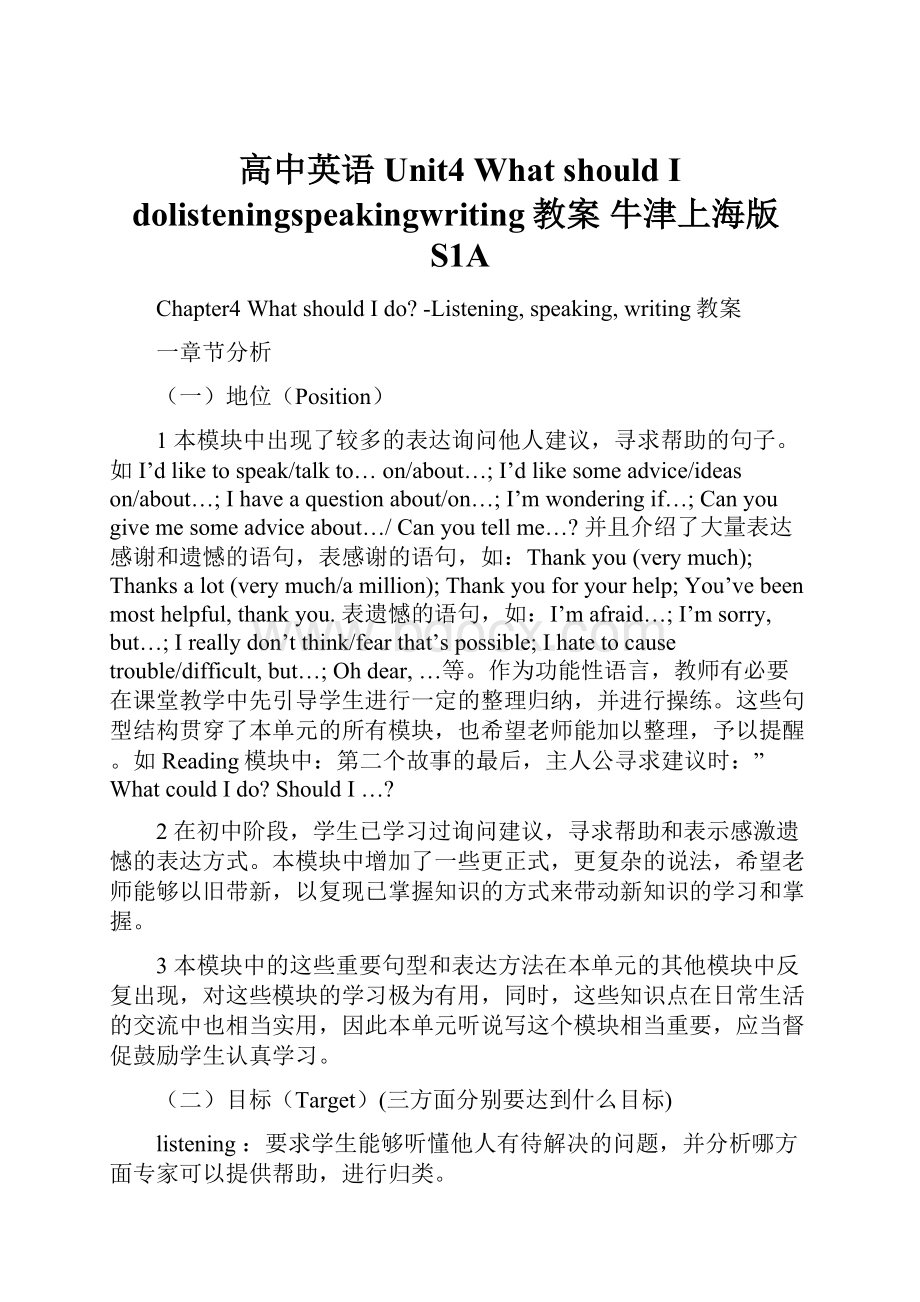 高中英语 Unit4 What should I dolisteningspeakingwriting教案 牛津上海版S1A.docx
高中英语 Unit4 What should I dolisteningspeakingwriting教案 牛津上海版S1A.docx
- 文档编号:10684901
- 上传时间:2023-02-22
- 格式:DOCX
- 页数:15
- 大小:20.57KB
高中英语 Unit4 What should I dolisteningspeakingwriting教案 牛津上海版S1A.docx
《高中英语 Unit4 What should I dolisteningspeakingwriting教案 牛津上海版S1A.docx》由会员分享,可在线阅读,更多相关《高中英语 Unit4 What should I dolisteningspeakingwriting教案 牛津上海版S1A.docx(15页珍藏版)》请在冰豆网上搜索。

高中英语Unit4WhatshouldIdolisteningspeakingwriting教案牛津上海版S1A
Chapter4WhatshouldIdo?
-Listening,speaking,writing教案
一章节分析
(一)地位(Position)
1本模块中出现了较多的表达询问他人建议,寻求帮助的句子。
如I’dliketospeak/talkto…on/about…;I’dlikesomeadvice/ideason/about…;Ihaveaquestionabout/on…;I’mwonderingif…;Canyougivemesomeadviceabout…/Canyoutellme…?
并且介绍了大量表达感谢和遗憾的语句,表感谢的语句,如:
Thankyou(verymuch);Thanksalot(verymuch/amillion);Thankyouforyourhelp;You’vebeenmosthelpful,thankyou.表遗憾的语句,如:
I’mafraid…;I’msorry,but…;Ireallydon’tthink/fearthat’spossible;Ihatetocausetrouble/difficult,but…;Ohdear,…等。
作为功能性语言,教师有必要在课堂教学中先引导学生进行一定的整理归纳,并进行操练。
这些句型结构贯穿了本单元的所有模块,也希望老师能加以整理,予以提醒。
如Reading模块中:
第二个故事的最后,主人公寻求建议时:
”WhatcouldIdo?
ShouldI…?
2在初中阶段,学生已学习过询问建议,寻求帮助和表示感激遗憾的表达方式。
本模块中增加了一些更正式,更复杂的说法,希望老师能够以旧带新,以复现已掌握知识的方式来带动新知识的学习和掌握。
3本模块中的这些重要句型和表达方法在本单元的其他模块中反复出现,对这些模块的学习极为有用,同时,这些知识点在日常生活的交流中也相当实用,因此本单元听说写这个模块相当重要,应当督促鼓励学生认真学习。
(二)目标(Target)(三方面分别要达到什么目标)
listening:
要求学生能够听懂他人有待解决的问题,并分析哪方面专家可以提供帮助,进行归类。
speaking:
要求学生掌握表达感谢和遗憾的常用句型结构;并在复习课文内容的基础上,让学生进一步思考如何解决文中出现的问题,从而掌握如何给出建议和提供帮助的表达方式。
writing:
要求学生在听和说这两个环节的练习后,能够在提示的帮助下,进行描述问题,寻求帮助,给出建议的写作练习。
(三)重点和难点(ImportantandDifficultPoints)(同上)
listening:
在听力练习中要注意不仅要让学生完成书本上的听力练习,还要能对问题的描述,和寻求建议帮助的功能句型有初步的注意,如果能够及时进行归纳就更好。
speaking:
共两个练习,起到不同作用,练习一:
让学生操练表示寻求帮助,表示感谢或遗憾的表达方式;练习二:
让学生操练对解决问题提出建议或忠告的表达方式。
这部分难度较高,所以此练习提供了一系列的问题来帮助学生,并建议以小组为单位来完成此练习。
writing:
写作部分是整个单元学习效果的综合展现,是阅读部分,听和说练习的深入,希望老师能督促学生充分运用已学知识完成此练习。
补充:
1.关键词:
Listening:
legal合法的;法律的financial财政上的,金融的
scratch抓,挠share股票
Speaking:
available有空的,不忙的appointment约会,预约appreciate欣赏;感激
Writing:
shoplift在商店中偷窃
2.功能句型
1)Askingforadvice:
I’dliketospeak/talkto…on/about…
I’dlikesomeadvice/ideason/about…
Ihaveaquestionabout/on…
I’mwonderingif…
Canyougivemesomeadviceabout…
Canyoutellme…?
2)Expressinggratitude/thanks:
Thankyou(verymuch)
Thanksalot(verymuch/amillion)
Thankyoufor(all)yourhelp
You’vebeenmosthelpful,thankyou.
That’sperfect.
Thatwouldsuitmefine.
3)Expressingregret:
I’mafraid…
I’msorry,but…
Ireallydon’tthink/fearthat’spossible
Ihatetocause/betrouble,but…
I’msorrytobedifficult,but…
Ohdear,…
一、教学设计(TeachingDesigns)
教学内容
教学实施建议
教学资源参考
Listening
此部分需重点处理的单词有legal合法的;法律的financial财政上的,金融的以及tapescript中的scratch抓,挠share股票;
此听力练习主要是训练学生学会区分生活中出现的问题,将问题正确分类,希望能让学生通过此练习提高听力理解能力,并在理解的基础上进行问题的分析,体现了听力练习的实际交际功能,也是对reading部分主题的延伸和具体应用。
在进行此练习之前,有必要先指导学生怎样分析判断各种问题的类型,可以先进行一个口头练习或辅助听力练习(链接1),同时也帮助学生学习听力练习中将会出现的新词,然后开展课文中的听力练习,在练习过程中要注意提醒学生留意描述问题,寻求建议的各种句型用法,建议听一段讲解一段,(教师可以将这些问题制作成Powerpoint,以简单的语句列出,在讲解后展示给学生看,后speaking练习还要用到,参考链接3)在此练习后,可以根据听力练习内容,引导学生思考,“当遇到这些问题时,该怎么办呢?
又该如何表达呢?
”从而自然过渡到speaking练习。
教参第61页
Speaking
此部分需处理的重点单词有available有空的,不忙的appointment约会,预约appreciate欣赏;感激
此练习包括两部分:
A部分学会如何表达感激感谢和遗憾抱歉B部分针对不同问题,提出建议和解决方法。
A部分由于属于初中阶段已掌握语言技能,因此大部分学生不需要着重操练,可以由教师根据具体情况加以处理,建议将表达感激和抱歉的功能性语句进行整理归纳。
(链接2)
B部分属于在reading和listening练习的基础上进行的深入拓展练习,是本模块的重点内容,应该好好利用,可以结合reading部分、listening部分所学内容,以解决问题为任务,鼓励学生进行口头表达能力的操练,除了练习中所给出的问题(也是课文中出现的问题),教师还可以补充更多的问题以供学生操练(可以与listening练习结合起来,把listening中的材料更好的利用起来,具体处理方法见链接3)。
社会上相关题材的发言
Writing
此部分需重点处理的单词有shoplift在商店中偷窃
本章节的写作是以信的形式,教师应当将写信的格式讲解清晰;接着指导学生有效的以书面的形式表达自己的观点;练习如何描述问题,并提出反馈评价,针对问题提出建议或解决方法。
本练习在MoreLanguageInput部分之后进行,也许学生会写得更得心应手。
教师也可以创设更多类似情景或整理有用表达方式(补充相关内容见链接4),帮助学生更好地进行写作练习。
[链接1]
说明:
在进行课本听力训练之前,学生可能会对课文中出现的问题类型的概念不太清楚,因此教师有必要在开展听力练习之前,对这些概念进行解释,同时也作为是练习前的热身和辅助。
辅助听力练习:
ListentothetapeondifferenttypesofproblemsandmatchthestatementsinColumnAwithColumnBaccordingtowhatyouhear:
1.PersonalProblemsa.theproblemsofthesickwhoneedtreating,
2.Financialproblemsb.theproblemsoflookingafteryourpets
3.Foodproblemsc.theproblemsaboutthelaw
4.Housingproblemsd.theproblemsoflookingforsomeplacetolivein
5.Animalcareproblemse.theproblemsofaparticularpersonusuallyprivate
6.Medicalproblemsf.theproblemsofhowtoeducatechildren
7.Educationproblemsg.theproblemsdealingwithmoneymanagementskills
8.Legalproblemsh.theproblemsofone’sdiet
Tapescript:
Nowadays,inourdailylife,wealwayshavetofacedifferentproblems,whichcanusuallybeclassifiedintoseveralspecificgroups.
Whenwetalkaboutpersonalproblems,werefertotheproblemsofaparticularpersonusuallyprivateandfinancialproblemsarethosedealingwithmoneymanagementskills.Foodproblemsrefertotheproblemsofone’sdiet,i.e.,whatheeats.Whenyouarelookingforsomeplacetolivein,forexample,youarefacinghousingproblemsandwhenyouhavetroubleinlookingafteryourpets,youcomeacrossanimalcareproblems.Medicalproblems,educationproblemsandlegalproblemsarecommontoseeinoureverydaylife.Whenthesickneedtreating,theymighthavemedicalproblems.Whenyouhavesomequestionsonhowtoeducateyourchildren,thenyouneedtosolveyoureducationproblems,andifyouneedsomehelpfromalawyerforadviceaboutthelaw,youhavelegalproblems.
Keys:
1----e2-----g3------h4-----d
5-----b6------a7------f8------c
[链接2]
说明:
此类针对语言功能进行的口头操练,教师应该引导学生进行功能句型的整理归纳,这样能够帮助学生更好地开展之后的练习。
功能句型的整理归纳:
1)Askingforadvice:
I’dliketospeak/talkto…on/about…
I’dlikesomeadvice/ideason/about…
Ihaveaquestionabout/on…
I’mwonderingif…
Canyougivemesomeadviceabout…
Canyoutellme…?
2)Expressinggratitude/thanks:
Thankyou(verymuch)
Thanksalot(verymuch/amillion)
Thankyoufor(all)yourhelp
You’vebeenmosthelpful,thankyou.
That’sperfect.
Thatwouldsuitmefine.
3)Expressingregret:
I’mafraid…
I’msorry,but…
Ireallydon’tthink/fearthat’spossible
Ihatetocause/betrouble,but…
I’msorrytobedifficult,but…
Ohdear,…
[链接3]
说明:
为了更好地利用课文资源,也为了能让学生更好地巩固已学语言功能,因此可以考虑开展这个补充练习,难度不大并且能更自然地过渡到writing练习。
补充speaking练习:
Turntopage61andhaveaquickreviewoftheproblemsmentionedinListeningExercise.Couldyoupleaseactastheexpertsonthephoneandgiveadviceonsomeproblems?
Haveadiscussioninyourgroup,makereferencetothestructuregivenandreportyourconclusiontotheclasswhenyoufinish.
CallerA:
Hehaslosthisjob.Hedoesn’tknowwhattodoandhe’sunhappy.
CallerB:
Hercatseemstobelosingfur.
CallerC:
Hedoesn’tknowwhattodowithhissavings.
CallerD:
Sheisworriedaboutherheadache.
CallerE:
Heneedsadviceaboutlawbecausehisnewly-boughtcardoesn’twork.
CallerF:
Sheneedsadviceonwhethertosendhersontokindergartenornot.
CallerG:
Heneedsadviceaboutrentingorbuyingaflat.
CallerH:
Sheneedsadviceaboutherbadly-behavedson.
CallerI:
Heneedshelptostophishairfromfallingout.
CallerJ:
Sheneedsadviceaboutlosingweight.
CallerK:
HeneedstoknowsomethingabouttaxsysteminHongKong.
CallerL:
Sheneedsadviceaboutgettingherdaughteratutor.
Possibleanswers(forreferenceonly)
Hereareourconclusionsandadviceabouttheproblems:
CallerA:
Weadvisethatheshouldsearchnewspapersforjobvacanciesandgotoajobcentertotryhisluck.
CallerB:
Weadviseshetakehercattoaprofessionalvet(兽医).
CallerC:
Weadvisethatheshouldinvest30percentofhissavingsonsharesandsavetherest.
CallerD:
Weadvisehertogotothehospitalandhaveathoroughexamination.
CallerE:
Weadvisethatheshouldemployalawyeratonce.
CallerF:
Weadvisehernottosendhersontokindergartenbecausehe’stooyoung.
CallerG:
Weadvisethathestartbyrentingaflat,whichismoreeconomical.
CallerH:
Weadvisethatsheshouldhaveaserioustalkwithhersonfirst.
CallerI:
WeadvisethemantotryZhangGuang101,whichisdefinitelyaneffectiveproducttostophishairfromfallingout.
CallerJ:
Weadvisethatthegirleatmorefruitandvegetablesinsteadofmeatandrice.
CallerK:
Weadvisethatheshouldgotothelocalbankfordetailedinformation.
CallerL:
Weadvisethatsheshouldcommunicatewithherdaughterfirsttofindoutherproblemsinstudy.
[链接4]
说明:
Usefulexpressionsofthedescriptionoftheproblems:
Thekindofproblemisthat…
That…isahugeproblemformebecause…
Usefulexpressionsofaskingforadvice:
I’dliketospeak/talkto…on/about…
I’dlikesomeadvice/ideason/about…
Ihaveaquestionabout/on…
I’mwonderingif…
Canyougivemesomeadviceabout…
Canyoutellme…?
Iactuallyneedhelp
Cananybodytellmehow…
Ifanyonehasanytipsonhowto…,please…
I'vnoideahowto…
Usefulexpressionsofgivingadvice:
Personally,Iwouldsuggestthat…(because…)
Firstlyyoushouldtalktotheschoolcounselor/teachers/parentsabout…
Thecounselorrecommendsthat…(should)…
Ifyou…,theoutcomeforyoumaybealotbetter.
Youmightaswell/hadbetterdo…
教案:
说明:
本课时是在学生学习了课文内容的基础上,进行关于描述问题,寻求忠告建议,表示感谢或遗憾等功能型语句的操练。
除了课本上所运用到的句型,教师可以进行适当补充。
教学内容难度适中,因为是听说写的练习,所以比较能够激发学生积极性和学习热情。
但教师有必要多创设情景,让学生在情景中进行更深层次的操练。
如下,提供了一份本课时的完整教案。
Pre-taskpreparation
1Warming-up:
Questionsonthecontentsofthetext
[Questionsforreference]
Howmanyproblemsarementionedinthetext?
(Three)
Whatdoesstory1tellus?
(Anaccident.)
Canyoutellusthestorybriefly?
教师提示:
When,where,who,what…
(参考:
教参PT58页,thesynopsisofthestory1)
Whatisstory2about?
(Badbehavior)
Whathastherudesupermarketassistantdonetothewriter?
(Shehasgiventhewriterextrachangebyaccident.)
Haveyouevermetsimilarproblemsinyourdailylife?
Canyoutellussomethingaboutit?
Whomwouldyouturntoforhelp?
教师提示:
Youneedtoknowhowtoclassifytheproblemsbeforeyouturntotherightpersonforhelp.
2Guidethestudentstocarryoutthepreparatorylisteningexercisetogetthemreadyforthelisteningexercise
Listentothetapeondifferenttypesofproblemsand
- 配套讲稿:
如PPT文件的首页显示word图标,表示该PPT已包含配套word讲稿。双击word图标可打开word文档。
- 特殊限制:
部分文档作品中含有的国旗、国徽等图片,仅作为作品整体效果示例展示,禁止商用。设计者仅对作品中独创性部分享有著作权。
- 关 键 词:
- 高中英语 Unit4 What should dolisteningspeakingwriting教案 牛津上海版S1A dolisteningspeakingwriting 教案 牛津 上海 S1A
 冰豆网所有资源均是用户自行上传分享,仅供网友学习交流,未经上传用户书面授权,请勿作他用。
冰豆网所有资源均是用户自行上传分享,仅供网友学习交流,未经上传用户书面授权,请勿作他用。
链接地址:https://www.bdocx.com/doc/10684901.html


 《城市规划基本知识》深刻复习要点.docx
《城市规划基本知识》深刻复习要点.docx
